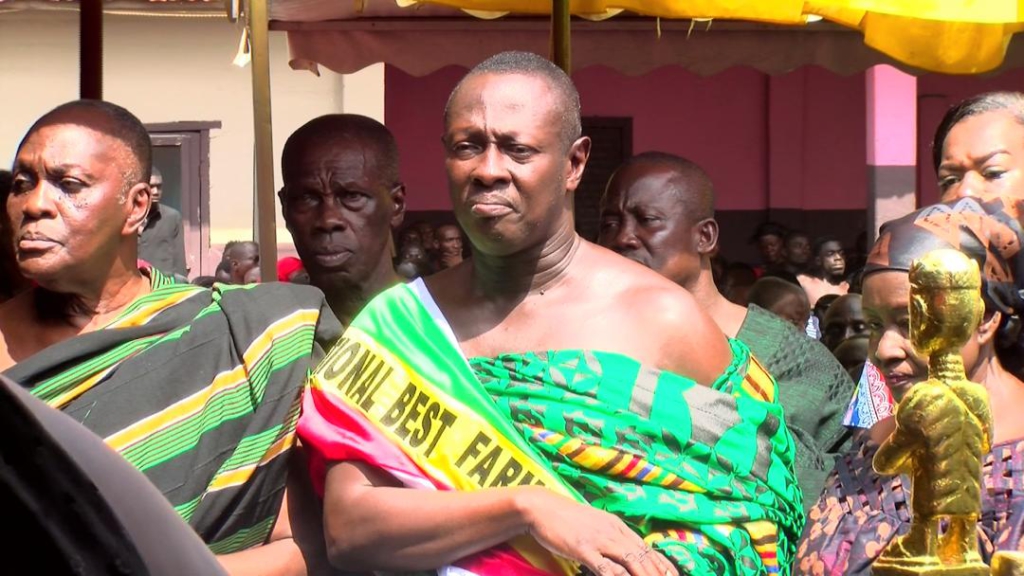Asantehene Otumfuo Osei Tutu II has bemoaned the country’s over-dependence on imported goods including staples to feed the citizenry at the expense of the vast plantations available for local food production.
He believes maximising local farming would reduce the expensive importation of food crops to help save the depreciating cedi and eventually restore the exacerbating economic situation.
“Take a critical look at our economy now. Ghana imports rice, tomatoes and other food items. But we complain of hardship. The dollars used for the importation contribute to the depreciating cedi.
"Cocoa and gold are what we used to purchase the dollar and the same cash is what we use for the importation of food items. This contributes to the cedi depreciating. If we grow these crops locally we can improve the economy,” he said.
Despite the sizable land resources available in Ghana, the country is yet to be self-reliant in its agricultural production as it currently imports food staples including rice and tomatoes.
The Asantehene bemoaned the country’s inability to produce some essential crops locally, as the youth hunt for white-collar jobs other than pursuing agriculture to boost the economy.

Otumfuo touted his involvement in farming with some of his sub-chiefs and encouraged the youth, traditional leaders and even government officials to venture into farming.
“The youth nowadays prefers chasing after white-collar jobs. They prefer to stay in the offices and become directors of a particular business than to gather their tools and start a farm.
"I have been involved in farming with Otuo Siriboe. When I wanted to begin my palm plantation at Ofoase, he contacted me. He and I planted palm trees. We’ve even planted mangoes at Nkoranza,” he said.
A delegation from the Juabeng Traditional Council, including the 2022 National Best Farmer, Nana Yaw Serebour, son of the chief of Juabeng, paid a courtesy visit to the Manhyia Palace.
The Asantehene, amazed at the achievement of Nana Yaw, admonished other traditional leaders to follow in the footsteps of the Akyempemhene to take up agriculture in providing a livelihood for their indigenes.
“Every stool has land allocated to it. But the chiefs prefer to stay in the cities than to farm on these lands. We should emulate this to build our country,” he said.

Nana Yaw Sarpong Serebour was adjudged the best national farmer at the 38th Farmers’ Day Celebration for his extensive production in both mixed crop and livestock farming.
With current technological advancements in farming, the 43-year-old mechanical engineer reiterated the urgency for the youth to be involved in farming.
“With technological advancement, farming is no longer the cutlass and hoe method that we used to know. It’s not small-scale farming anymore.
"Farming has really advanced where you can do a lot of things with technology. It’s good for the youth, with the education that they have to get themselves involved and phase out the aged. Without agriculture, as a nation, we can’t survive,” he said.
Latest Stories
-
Agenda 111 to be discontinued if NDC comes to power – Akufo-Addo
7 mins -
Mahama begins 3-day tour of the Western Region today
12 mins -
NCCE holds Parliamentary Candidates’ dialogue at Kumbungu
29 mins -
Akufo-Addo commissions new oil and gas services terminal
30 mins -
Bono East NIB seizes stolen SHS rice, arrests driver
32 mins -
Petroleum Commission gives $3.6bn contracts to indigenous companies
1 hour -
COP29 ends with $300bn annual deal to fight climate change
1 hour -
South African anti-apartheid writer Breytenbach dies
2 hours -
One-million-dollar crop insurance premium paid for farmers
2 hours -
Over 30 winners enjoy indulgent rewards in Baileys Treat-Cation promo
2 hours -
Why Indians are risking it all to chase the American Dream
2 hours -
Martin Amidu: Government must account to electorates for the violent conflicts before 2024 election
3 hours -
‘Pregnant’ for 15 months: Inside the ‘miracle’ pregnancy scam
3 hours -
Disregard Wontumi TV presenter’s misleading broadcast on Election 2024 voting date – EC
3 hours -
Bawku crisis: ‘Merchants of conflict are exploiting Ghana’s fractured democracy’ – Martin Amidu
4 hours

